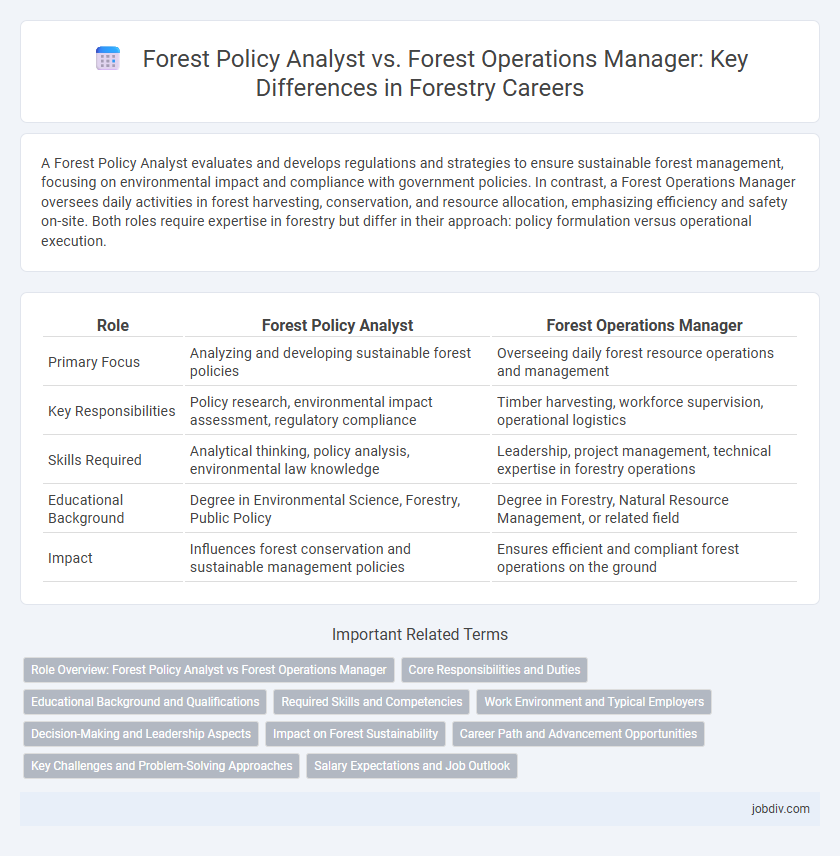A Forest Policy Analyst evaluates and develops regulations and strategies to ensure sustainable forest management, focusing on environmental impact and compliance with government policies. In contrast, a Forest Operations Manager oversees daily activities in forest harvesting, conservation, and resource allocation, emphasizing efficiency and safety on-site. Both roles require expertise in forestry but differ in their approach: policy formulation versus operational execution.
Table of Comparison
| Role | Forest Policy Analyst | Forest Operations Manager |
|---|---|---|
| Primary Focus | Analyzing and developing sustainable forest policies | Overseeing daily forest resource operations and management |
| Key Responsibilities | Policy research, environmental impact assessment, regulatory compliance | Timber harvesting, workforce supervision, operational logistics |
| Skills Required | Analytical thinking, policy analysis, environmental law knowledge | Leadership, project management, technical expertise in forestry operations |
| Educational Background | Degree in Environmental Science, Forestry, Public Policy | Degree in Forestry, Natural Resource Management, or related field |
| Impact | Influences forest conservation and sustainable management policies | Ensures efficient and compliant forest operations on the ground |
Role Overview: Forest Policy Analyst vs Forest Operations Manager
A Forest Policy Analyst evaluates and develops regulations to promote sustainable forest management, analyzing environmental impacts, economic factors, and legislative frameworks. A Forest Operations Manager oversees daily forestry activities, including harvesting, road construction, and reforestation, ensuring operational efficiency and compliance with safety and environmental standards. The Analyst emphasizes policy development and strategic planning, while the Manager focuses on practical implementation and field coordination.
Core Responsibilities and Duties
A Forest Policy Analyst evaluates and develops sustainable forestry regulations, conducting research on environmental impact and advising policymakers on best practices for resource management. In contrast, a Forest Operations Manager oversees on-the-ground activities such as timber harvesting, reforestation, and compliance with safety and environmental standards to ensure efficient forest resource utilization. Both roles are crucial for balancing ecological sustainability with economic objectives in forest management.
Educational Background and Qualifications
A Forest Policy Analyst typically holds a degree in environmental science, forestry, public policy, or natural resource management, emphasizing research skills and policy analysis expertise. In contrast, a Forest Operations Manager usually possesses a degree in forestry, forest engineering, or a related technical field, with strong qualifications in operational planning, resource management, and leadership. Professional certifications such as Certified Forester (CF) or Project Management Professional (PMP) can enhance qualifications for both roles but are more common for managers overseeing complex forestry operations.
Required Skills and Competencies
Forest Policy Analysts require expertise in environmental laws, data analysis, and stakeholder communication to develop and assess sustainable forestry policies. Forest Operations Managers must possess strong leadership, project management, and technical skills in forest machinery and harvesting techniques to oversee day-to-day logging and restoration activities. Both roles demand knowledge of ecological principles and regulatory compliance, but Analysts emphasize policy synthesis while Managers focus on operational execution.
Work Environment and Typical Employers
Forest Policy Analysts typically work in office settings within government agencies, environmental organizations, or research institutions, analyzing and developing policies to support sustainable forestry practices. Forest Operations Managers primarily operate on-site at timberlands, mills, or logging companies, overseeing daily harvesting activities, resource management, and compliance with safety and environmental regulations. Common employers for Policy Analysts include federal and state forestry departments, while Operations Managers are often employed by private logging firms, forest product companies, or large landowners.
Decision-Making and Leadership Aspects
Forest Policy Analysts specialize in evaluating and developing regulatory frameworks, relying on data-driven research to influence sustainable forest management practices. Forest Operations Managers lead field teams, making real-time decisions on resource allocation, harvesting techniques, and safety protocols to optimize productivity and environmental compliance. Both roles demand strong leadership, but analysts focus on strategic policy guidance while managers emphasize operational execution and team supervision.
Impact on Forest Sustainability
A Forest Policy Analyst influences forest sustainability by developing, evaluating, and recommending regulations and policies that promote conservation, biodiversity, and sustainable resource use. In contrast, a Forest Operations Manager directly implements these policies through overseeing harvesting, reforestation, and land management practices, ensuring operational activities align with sustainability goals. The combined efforts of both roles are crucial for balancing ecological health with economic viability in forest management.
Career Path and Advancement Opportunities
A Forest Policy Analyst primarily focuses on developing, evaluating, and recommending policies related to forest management, conservation, and sustainability, often working with government agencies or environmental organizations. Career advancement typically involves transitioning into senior policy advisory roles or leading research projects influencing national or international forest regulations. In contrast, a Forest Operations Manager oversees on-the-ground forestry activities, coordinating harvest, reforestation, and resource management, with career growth leading to executive positions managing large forestry operations or corporate environmental strategies.
Key Challenges and Problem-Solving Approaches
Forest Policy Analysts face challenges in interpreting complex environmental regulations and balancing ecological sustainability with socio-economic interests, requiring strong skills in policy evaluation, stakeholder analysis, and impact assessment. Forest Operations Managers confront logistical and operational difficulties such as resource allocation, equipment maintenance, and workforce coordination, relying on practical problem-solving methods including real-time decision-making, risk management, and optimization of harvesting techniques. Both roles demand adaptive strategies to address climate change impacts, regulatory compliance, and community engagement, yet they differ in focus with analysts shaping frameworks and managers executing ground-level operations.
Salary Expectations and Job Outlook
Forest Policy Analysts typically earn between $60,000 and $85,000 annually, reflecting their expertise in environmental regulations, policy development, and sustainable forest management practices. Forest Operations Managers command higher salaries, often ranging from $75,000 to $110,000, due to their responsibilities in overseeing logging operations, land management, and compliance with safety standards. Job outlook for both roles remains strong, driven by increasing demand for sustainable forestry practices and resource conservation.
Forest Policy Analyst vs Forest Operations Manager Infographic

 jobdiv.com
jobdiv.com